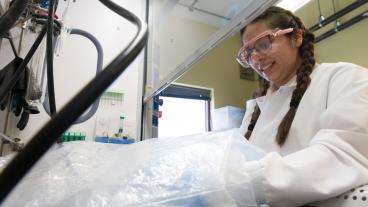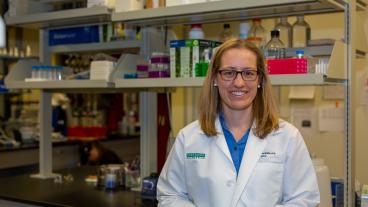GOLDEN, Colo., Dec. 2, 2015 – After a year’s hiatus, the Research Experiences for Undergraduates program on polymers at Colorado School of Mines has been renewed by the National Science Foundation.
Called Advancing Polymer Materials by Integrating Chemistry and Chemical Engineering, the 10-week program resumes in the summer of 2016 and will be funded through 2018.
Headed by Associate Professor of Chemistry and Geochemistry Stephen Boyes and Assistant Professor of Biological and Chemical Engineering Ning Wu, the program seeks to engage students in polymer science and engineering, with an emphasis on 21st century needs such as renewable energy, sustainability, and health care.
At the end of the 20th century, mass-produced items such as car bumpers began to be made with polymers, which are lightweight and cost-effective. Now polymer science is being applied to fuel cell membranes, solar cells, and medical devices.
The plastic and polymer industry is the third-largest in the United States, shipping $380 billion in goods and employing nearly 900,000 workers in 2013, according to the NSF proposal by Boyes and Wu. Some estimates have 50 to 70 percent of all chemical engineers and chemists working in polymer-related industry, demonstrating the importance of educating up-and-coming scientists and engineers in the field.
“Introducing undergraduate research experiences such as this will train our future human resources and help drive the plastic and polymer industry toward more advanced technology, innovative products, and efficient processes,” said Boyes and Wu.
As the name implies, REUs give undergraduates the opportunity to conduct original research. In this case, students work with one or more faculty members in the departments of Chemistry or Chemical and Biological Engineering.
Participants attend technical workshops on the major topics in polymer science and engineering, as well as workshops on developing professional skills, such as technical writing, scientific presentations, and entrepreneurship. Trips to sites such as the National Renewable Energy Laboratory and Children’s Hospital of Colorado will show how research becomes applied science. Students also enjoy social events with other REU participants, graduate students, and faculty.
The program provides a stipend of $5,000, on-campus housing, full access to campus services, and financial help with travel to and from Golden.
Boyes said the REU program emphasizes diversity in research teams in terms of experience, gender, and ethnicity. The program first took place during the summers of 2012 through 2014, attracting 327 applicants. Thirty-five students from across the U.S. attended the program in that time, 49 percent of whom were female. Twenty-nine percent came from minority and other under-represented groups.
Organizers quantify the success of the program by tracking its students who earn their bachelor’s degrees, present at national and regional meetings, and publish in peer-reviewed journals. Participants have gone on to have 15 manuscripts published or submitted for peer review, and 11 have presented their research as a poster at conferences. Two students have won best undergraduate poster awards at the national meetings of the American Institute of Chemical Engineers (AIChE) and American Chemical Society (ACS).
The program, on the web at polymerreu.mines.edu, is accepting applications until March 4, 2016.
Contact:
Mark Ramirez, Information Specialist, College of Applied Science & Engineering | 303-384-2622 | ramirez@mines.edu
Karen Gilbert, Director of Public Relations, Colorado School of Mines | 303-273-3541 | kgilbert@mines.edu



